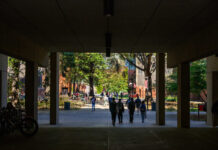
As families get ready for a special 4th of July to celebrate our nation’s birthday, it is important to enjoy fireworks safely. Eye injuries related to fireworks can be particularly devastating. A fireworks blast can rupture the eyeball as well as cause chemical and thermal burns, corneal abrasions, trauma to the eye socket or retinal detachment. The U.S. Consumer Product Safety Commission reported that fireworks were responsible for nearly 13,000 injuries requiring treatment in emergency rooms in 2017. Of those, 1,200 were eye injuries.
“As an ocular and orbital trauma surgeon, I have seen some disastrous fireworks-related injuries. I have treated patients from the ages of 6 to 76 with eye or orbit-related fireworks trauma,” said Jeremy Clark, MD, of UofL Physicians – Eye Specialists and associate professor at the UofL School of Medicine. “I have even had to tell a volunteer firefighter that his vision and eye could not be saved as a result of injuries from a fireworks explosion.”
One common myth about fireworks is that “small is safe.” A sparkler can burn at nearly 2,000 degrees. That is nearly 10 times as hot as boiling water. Even poppers or snappers can cause damage to eyes, Clark said.
The American Academy of Ophthalmology has provided helpful tips to keep yourself and your loved ones safe this fireworks season.
For those who attend professional fireworks displays or live in communities surrounding the shows:
- Respect safety barriers at fireworks shows and view fireworks from at least 500 feet away.
- Do not touch unexploded fireworks. Instead, immediately contact local fire or police departments to help.
For those who decide to purchase and use consumer fireworks in states where they are legal:
- Never let children play with any type of firework, including sparklers.
- People who handle fireworks should always wear protective eyewear that meets the parameters set by the American National Standards Institute.
- Leave the lighting of professional-grade fireworks to trained pyro technicians.
If you experience a fireworks-related eye injury:
- Seek medical attention immediately.
- Avoid rubbing or rinsing the eyes or applying pressure.
- Do not remove any object from the eye, apply ointments or take any pain medication before seeking medical help.
Clark urges parents and guardians to address fireworks safety with their children so they know the risk of blindness is real.
Download, print and share the UofL Physicians – Eye Specialists safety guide here.































